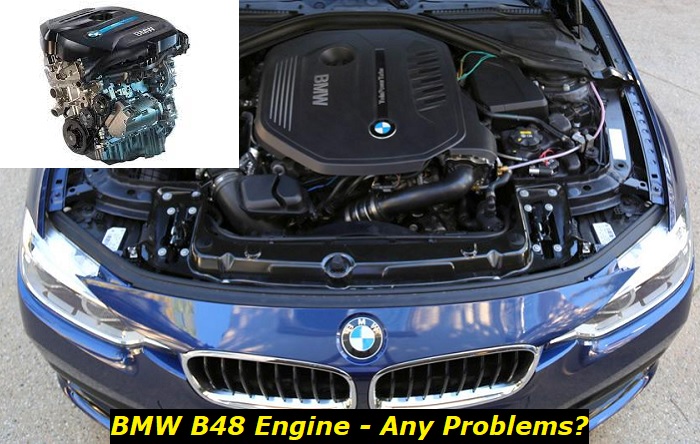For several people, BMW is the manufacturer to look to for dependability and of course, sleek vehicles. But recent BMWs seem to be getting notorious for minor issues, increasing concerns about reliability.
One such reservation is about the B48 engine. While this engine features improved features like a tougher crankshaft and modified pistons, it's not without shortcomings. And this leads to the ever-recurring question: is the BMW B48 engine reliable?
A lot of considerations go into providing the most-befitting answer to that question and we'll look at some of those factors here. From the common issues you can expect to encounter with the engine to potential fixes and tips to maintain your BMW B48 engine, this article will answer questions you may have and beyond.

Key facts and my opinion about the engine
- Production years: 2014-now
- Average lifespan of B48: 140,000-160,000 miles
- Fuel supply type: direct injection
- Power range: 156-306 hp
- Fuel efficiency: good
- Engine block material: aluminum
- Engine reliability score: low
- The most common problems: intensive oil consumption, poor balance shaft bearings, very demanding to oil quality
BMW B48 Engine Common Problems
While the B48 Engine has proven to be reliable for many drivers, there are a few common issues that other owners have reported. Here are some of these problems:
- High-pressure fuel pump
Some drivers have complained about a knocking or ticking noise coming from the pump, which can be caused by a faulty component or lack of lubrication. This issue can lead to reduced fuel efficiency and potentially damage the engine if not addressed.
- Faulty valve
Another issue that has been reported with the B48 engine is the possibility of a faulty exhaust gas recirculation (EGR) valve. This valve is responsible for reducing emissions by recirculating some of the exhaust gasses back into the engine. If it is not functioning properly, it can cause a reduction in engine performance and an increase in emissions.
- Oil consumption
Some B48 owners have also noticed that their engines consume oil at an alarming rate. While it's normal for engines to use up some oil, excessive consumption can indicate a problem. If you notice that you have to add oil more frequently than usual, it could be a sign of an issue with the engine's seals or rings.
- Timing chain tensioner problems
The timing chain tensioner is responsible for maintaining proper tension on the timing chain, which helps keep the engine running smoothly. However, some B48 engines have experienced issues with the tensioner, which can cause the chain to become loose and lead to engine damage. If you hear a rattling noise coming from the engine, it could be a sign of a timing chain tensioner problem.
- Throttle actuator issues
The throttle actuator controls the amount of air entering the engine. If it fails, the engine might run poorly or even stall. A related problem here is a defective turbocharger. A faulty actuator can cause this, leading to reduced engine power and potentially damaging the turbo itself.
Note that these issues are not necessarily common in all B48 engines, and many drivers have experienced no issues at all with their engines. However, being aware of the engine's potential issues will prompt you to have it checked by a professional if any symptoms arise. Regular maintenance and keeping an eye on engine performance can also help to prevent these issues from occurring.
Fixing Common B48 Engine Issues
One common issue with the B48 engine is a rough idle. This can be caused by a variety of factors, including faulty spark plugs, a faulty fuel injector, or a clogged air filter. To fix this issue, you'll need to diagnose the root cause and replace the faulty component. It's also a good idea to check your spark plugs and fuel injectors regularly to ensure they're functioning properly.
You may also notice your engine misfiring. A faulty ignition coil or a clogged fuel filter can cause this issue. Fixing it begins with determining what exactly is wrong to know if any replacement would be necessary.
Some BMW owners experience an oil leak with their B48 engine. Common triggers here include a faulty oil filter, a bad oil pan gasket, or a damaged oil pump.
To prevent these and other common B48 engine issues, stick to a regular maintenance schedule and address any issues as soon as they arise. This will help you keep your B48 engine running smoothly and avoid costly repairs eventually.
Maintaining the BMW B48 Engine
Like any engine, the BMW B48 can develop issues if not properly cared for. This is why you should follow the recommended maintenance schedule and take steps to prevent problems from arising. Here are some tips for maintaining your BMW B48 engine to keep it running smoothly:
- Use high-quality oil and filters:Using the correct oil and filters for your engine is good for its health. BMW recommends using BMW Longlife-01 oil, which is formulated specifically for their engines. Also, use OEM or high-quality aftermarket filters that effectively filter out contaminants and debris.
- Follow the recommended service intervals:These service intervals are based on the manufacturer's recommendations and are designed to keep your engine running smoothly and prevent issues. So take your car in for regular oil changes, inspections, and any other recommended services to keep your engine in top condition.
- Keep an eye on your engine's performance:If you notice any unusual noises, performance issues, or warning lights, have your engine checked out as soon as possible. Don't wait until something major goes wrong - addressing small issues early can save you a lot of money and hassle in the long run.
- Use the correct fuel:Your BMW B48 engine is designed to run on premium fuel, so you always want to fill it up with exactly that. Using lower-grade fuel can negatively impact your engine's performance and may cause issues down the line.
- Drive responsibly:Remember that how you drive your car can impact its engine health. Avoid excessive revving, hard acceleration, and sudden braking, as these can put unnecessary strain on your engine.
BMW B48 Engine Repair Cost
The cost of repairing a BMW B48 engine can vary greatly depending on the specific issue you're facing. Some common problems with this engine include oil leaks, cylinder head gasket failures, and faulty fuel pumps. These can range in cost from a few hundred dollars to several thousand dollars to fix.
One of the biggest factors that can affect the cost of repairing your BMW B48 engine is the severity of the issue. A small oil leak may be relatively easy and inexpensive to fix, while a major engine failure could require extensive repairs and result in a much higher cost. Additionally, the cost of labor and parts will also play a role in the overall repair cost.
It's always a good idea to get a quote from a trusted mechanic before proceeding with any repairs, as this will give you an idea of what to expect in terms of cost.
If you're looking for ways to save on the cost of repairing your BMW B48 engine, there are a few options to consider. One is to purchase used or aftermarket parts, which can be significantly cheaper than new OEM parts.
Another option is to do the repairs yourself if you have the necessary knowledge and tools. However, keep in mind that attempting to repair your engine on your own can be risky and could potentially result in further damage if not done correctly.
Final Questions
1) Is the BMW B48 engine prone to issues?
Like any engine, the BMW B48 engine can experience issues. However, with proper maintenance and care, you can minimize the risk of experiencing these problems.
2) Can the BMW B48 engine be repaired or does it need to be replaced?
In most cases, you can repair a faulty BMW B48 engine. However, if the damage is severe, it may need to be replaced. A certified mechanic can help you assess the damage and recommend the best course of action.
3) How can I tell if my B48 engine is experiencing issues?
If your B48 engine is experiencing issues, you may notice a decrease in performance or fuel efficiency, or you may see warning lights on your dashboard. Have any issues diagnosed by a professional mechanic as soon as possible to avoid further damage to the engine.
Conclusion
Indeed, the BMW B48 engine has its fair share of issues. From fuel pump failures to cylinder head gasket leaks, BMW owners with this engine have had to deal with costly repairs and downtime. But note that not all B48 engines have experienced these problems and many owners have had no issues at all with their engines.
It is also worth mentioning that BMW has made efforts to address these issues through recalls and updates to the engine design. Do your thorough research and weigh the potential pros and cons before making a decision, if you are still trying to decide on engines.
Ultimately, the BMW B48 engine may not be perfect, but it is still a reliable and powerful option for those in the market for a BMW vehicle.
About the authors
The CarAraC research team is composed of seasoned auto mechanics and automotive industry professionals, including individuals with advanced degrees and certifications in their field. Our team members boast prestigious credentials, reflecting their extensive knowledge and skills. These qualifications include: IMI: Institute of the Motor Industry, ASE-Certified Master Automobile Technicians; Coventry University, Graduate of MA in Automotive Journalism; Politecnico di Torino, Italy, MS Automotive Engineering; Ss. Cyril and Methodius University in Skopje, Mechanical University in Skopje; TOC Automotive College; DHA Suffa University, Department of Mechanical Engineering






Add comment